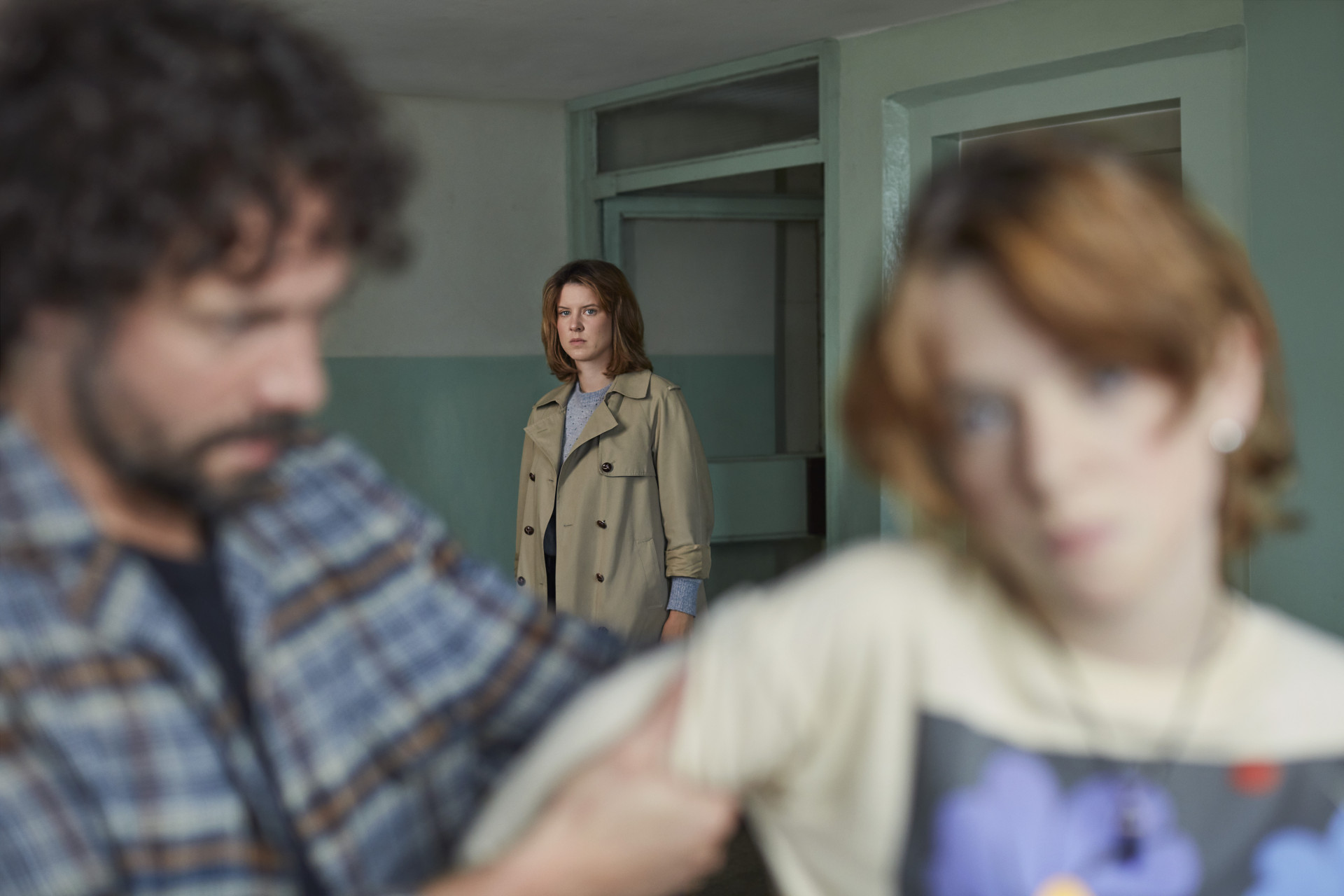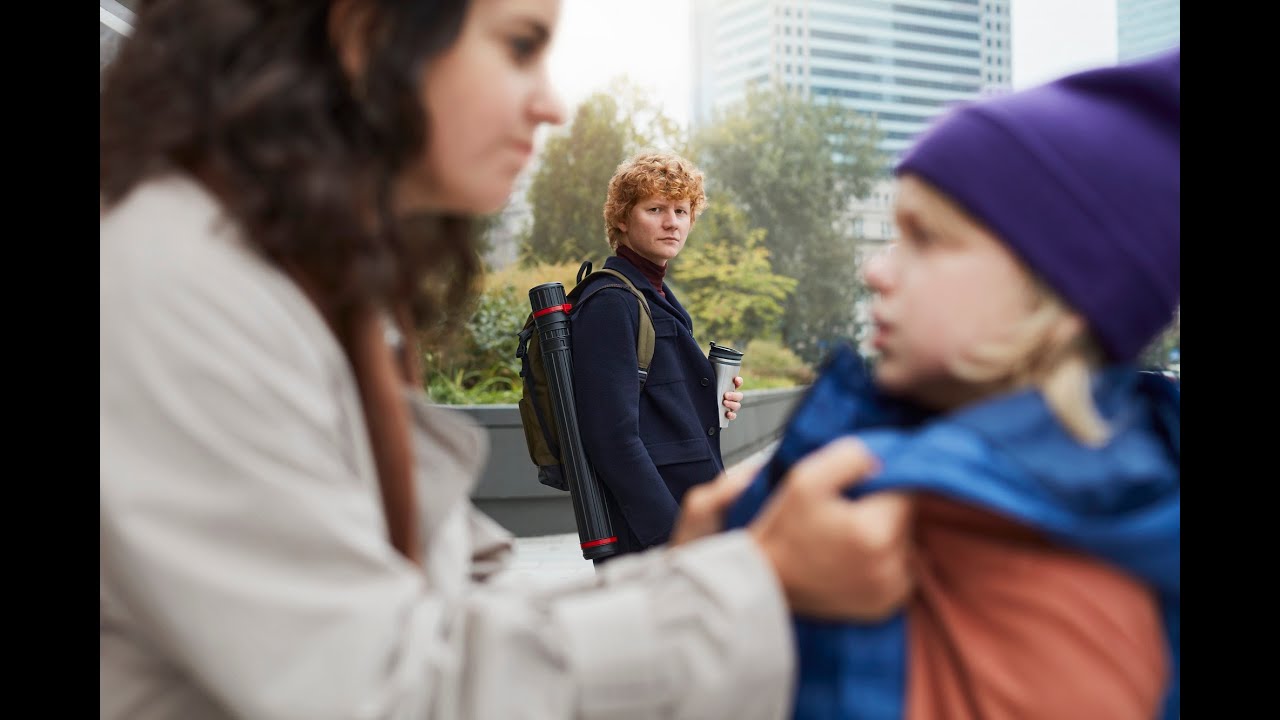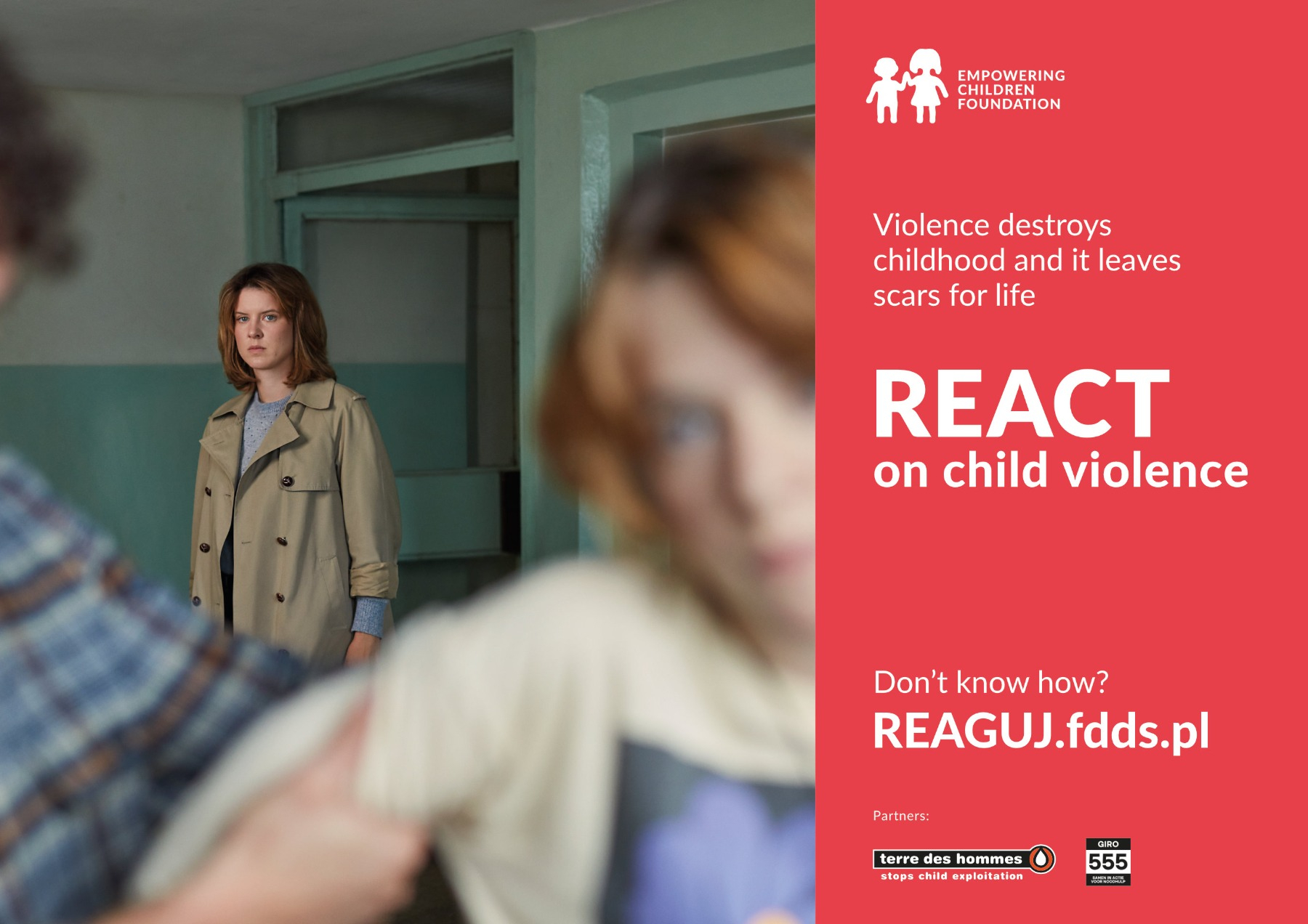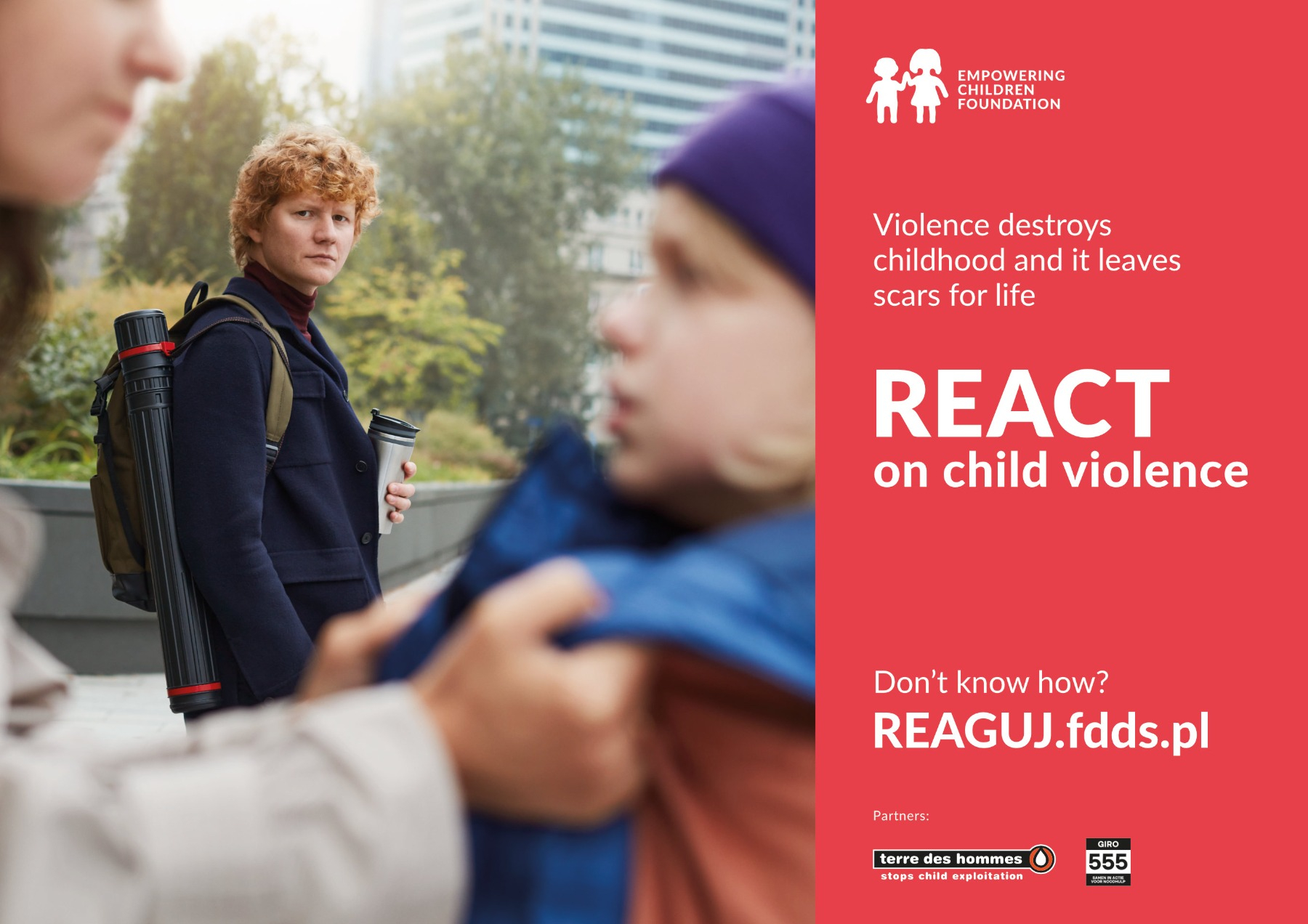Do you need support in reacting to violence against a child? Call us and talk to the specialist
React to violence
against children
Violence destroys childhood and it leaves scars for life
that a child is in danger
React to the threat to life
If you suspect that a child is at serious risk, do not hesitate – call the police immediately by dialing 112 or 997!
112 – general emergency number. The operator will direct you to the right emergency service – police, ambulance, or fire brigade.
997 – police emergency number. You will call the nearest police station.
Emergency numbers 112 and 997 are free of charge and available 24/7.
When the police arrive, they may, depending on the situation:
- Detain a person who is using violence against a child – if this person has committed an offense or there is concern that he/she may commit one.
- Secure traces and evidence relating to the offense.
- Initiate a Blue Card procedure [pl.: procedura Niebieskiej Karty]. As a result, persons from different public institutions (including police officer, psychologist, doctor, social worker) will analyze the situation and undertake the measures aiming at supporting the child, providing him/her with aid and ensuring his/her safety
You can also contact the police (by telephone or at the police station) in order to report the suspected crime against a child. After receiving such a notification, the police are required to investigate the case.
React to domestic violence
You know or suspect, that a child is a victim of domestic violence, both physical or emotional? REACT
If it is suspected that a child may be at risk of violence, a social assistance centre is required to address this case and to initiate so called Blue Card procedure [pl.: procedura Niebieskiej Karty]. Under the Blue Card procedure, a social worker will investigate the situation of the child’s family and intervention and assistance measures will be planned.
In order to report violence, go to a social assistance centre or call it. Social assistance centre may send its worker to visit the family and to conduct a family interview.
The address and the telephone number to the appropriate social assistance centre are available at the city’s, municipality’s or district’s website. You can also enter proper keywords in an online search engine: “Ośrodek Pomocy Społecznej + city’s name + district’s name”.
When you are faced with this worrying situation, you can share it with a worker from the abused child’s nursery school, kindergarten or school. Share your suspicions with a counselor or a principal of a given facility. These are the persons who are often aware of the child’s and his/her family’s situation, and they will know how to react. Educational facilities should have intervention schemes developed to follow in case of suspecting the abuse of a child. Moreover, a kindergarten and a school can initiate the Blue Card procedure [pl.: procedura Niebieskiej Karty]. As a result, persons from different public institutions (including a police officer, psychologist, doctor, social worker) will analyze the situation and undertake the measures aiming at supporting the child, providing him/her with aid and ensuring his/her safety.
You can share your concerns about the child’s situation with the police officer competent for the place of residence of the child or any other police officer.
In order to contact the police, dial 997 (free of charge, available 24/7).
In order to find the nearest police station and check the competent police officer’s name and telephone number, use an online search engine or a mobile application “Moja Komenda” (in Polish only).
The police officer competent for the district can enter the house or the apartment and investigate the child’s situation immediately. When the police officer finds that the child is a victim of domestic violence, he/she may initiate the Blue Card procedure [pl.: procedura Niebieskiej Karty]. As a result, persons from different public institutions (including a police officer, psychologist, doctor, social worker) will analyze the situation and undertake the measures aiming at supporting the child, providing him/her with aid and ensuring his/her safety.
You can notify a family court about the situation of using violence against a child – choose the one that is nearest to the child’s place of residence. The letter with a request to inspect the child’s situation may be sent anonymously. When a family court finds out about a child at risk, it is obliged to undertake activities aiming at investigating his/her situation, at protection and at supporting parents in bringing up a child.
You can write such notification by yourself. There is no need to use any standard form. However, if you want to use a notification form template, you will find it below. In your notification describe the child’s situation, provide his/her first name and the surname – if you know them. It is important that you give the child’s address, so that the court would be able to take action.
Notification form template – notification to the court
You can also notify the court by an oral statement – to do this, go to the family court and talk to a person working there.
You can find contact details of the nearest family court at the website. Enter www.city’s name without Polish characters.sr.gov.pl (for example: www.gliwice.sr.gov.pl).
You can send your notification by traditional mail, electronic mail (email) or you can deliver it by yourself.
React to neglect
You know that a child is severely neglected? Parents leave them by themselves, do not take any interest in them, put them at risk of harm, fail to provide them with food, proper clothing, medical care? REACT
You can notify a family court about the situation of severe neglect of a child – choose the one that is nearest to the child’s place of residence. The letter with a request to inspect the child’s situation may be sent anonymously. When a family court finds out about a child at risk, it is obliged to undertake activities aiming at investigating his/her situation, at protection and at supporting parents in bringing up a child.
You can write such notification by yourself. There is no need to use any standard form. However, if you want to use a notification form template, you will find it below. In your notification describe the child’s situation, provide his/her first name and the surname – if you know them. It is important that you give the child’s address, so that the court would be able to take action.
Notification form template – notification to the court
You can also notify the court by an oral statement – to do this, go to the family court and talk to a person working there.
You can find contact details of the nearest family court at the website. Enter www.city’s name without Polish characters.sr.gov.pl (for example: www.gliwice.sr.gov.pl).
You can send your notification by traditional mail, electronic mail (email) or you can deliver it by yourself.
You can inform a local social assistance centre about the situation of severe neglect of a child. The letter with a request to inspect the child’s situation may even be sent anonymously, including by email.
A social worker will go to the family’s place of residence, and he/she will conduct a family interview. It will allow him/her to assess the family’s situation and to plan adequate measures responding to the problems in place. He/she will provide the parents with information on where and from whom they can receive support. The social worker can also initiate the Blue Card procedure [pl.: procedura Niebieskiej Karty], if he/she finds that the parents’ behaviour towards their child constitutes an intentional maltreatment. Under the Blue Card procedure, a social worker will investigate the situation of the child’s family and intervention and assistance measures will be planned.
Notification form template – notification to the social assistance centre
The address and the telephone number to the appropriate social assistance centre are available at the city’s, municipality’s or district’s website. You can also enter proper keywords in an online search engine: “Ośrodek Pomocy Społecznej + city’s name + district’s name”.
React to sexual abuse
You know or suspect, that a child is sexually abused? REACT
When an adult undertakes any sexual activity involving a child under the age of 15, it is always considered a crime.
Notify the regional prosecutor’s office or the police about the suspected sexual offense against a child (in a written or oral form). In the case of an oral notification, a record will be taken from your statement.
If you choose to notify the police, find a police station in the area where the offense was committed. If this is not possible, or you don’t know where exactly the offense took place – make a statement at the nearest police station. Your notification will be immediately transferred to the police station appropriate to the place where the event occurred, and all the further actions pertaining to the case will be carried out at that station.
In order to find the appropriate police station, use an online search engine or a mobile application “Moja Komenda” (in Polish only).
Notification form template – notification to the prosecutor’s office/police
In order to draft your statement correctly, you can consult a lawyer who provide legal advice at the local free legal assistance point, or you can receive support at the family support centre, social assistance centre, crisis intervention centre.
The list of local legal assistance points
Following the notification, the prosecutor’s office will conduct the explanatory proceedings. On this basis, it will decide whether to charge the suspect with the offense. His/her guilt will be decided by the court.
As from 2017, anyone is legally obliged to inform a law enforcement authority, if he/she suspects commission of an offense against a child’s wellbeing, such as grievous bodily harm, rape, and sexual abuse (Article 240(1) of the Polish Penal Code).
React to physical violence
You witness a parent or a caregiver using violence against a child in a public place? The child is pulled, called names, degraded, beaten (for example disciplined by spanking)? REACT
NOTICE
Make it known that you have noticed the situation of child abuse. Making an eye contact may be a sufficient reaction to prevent the abusive behaviour of a parent, caregiver or other adult accompanying a child. Don’t be afraid to watch. It is your right to observe what is happening in a public space.
ESTABLISH A CONTACT
When parents experience emotions which are so intense that they cannot prevent their violent behavior towards their child, they won’t accept any rational arguments. If you want to react effectively, try to ease the tension. Ask a simple question, such as: “Excuse me, has something happened?”. You can also refer to your own experience, for example: “I remember when my children were at this age. It’s a very difficult time. Can I help you with anything?”. Sometimes it is enough to say aloud: „I can see it’s hard for you” or “Sometimes we have a bad day, and it is hard for us to communicate”. The attempt to start such a conversation may in itself make a parent think and stop the abusive behavior towards a child. It can also serve as a starting point for a conversation leading to calming the situation down.
NAME THE SITUATION
Don’t criticize and don’t attack a person, but don’t avoid calling the situation by its real name either. Talk about what has worried you in a calm, yet firm manner – for example: “I could see that you hit a child”, “Don’t beat a child. Don’t ever do this”.
If an abuser becomes aggressive also towards you or if your attempt to stop the violence has not been successful and a child is still at risk of abuse, inform the police by calling 112 or 997.
112 – main emergency number. The operator will direct you to the right emergency service, which in this case is police.
997 – police emergency number. You will call the nearest police station.
Emergency numbers 112 and 997 are free of charge and available 24/7.
Your reaction makes a child feel safe again and it gives him/her a chance for better future.
or even his/her life!
Why is reacting so important?
Your reaction makes a child feel safe again and it gives him/her a chance for better future. It may protect child’s health or even his/her life!
Every form of violence has not only an immediate effect on a child. Some consequences, such as low self-esteem, relational difficulties, lower abilities to acquire knowledge, higher probability of aggressive and self-destructive behaviours, may be delayed in time.
While reacting to violence, you care about child’s safety and his/her good future.
A lot of children don’t have any close adults who can give them support and help them. When you react, you are showing to a child, that he/she is not alone, that he/she is important, and that you share your strength with him/her.
You are showing that there are adults who can be trusted.
By reacting, you refuse to agree to indifference towards child maltreatment.
You are showing to other adults, that one may and should oppose to violence against children.
child safety
phone number
Do you need support in reacting to violence against a child? Call 800 100 100 and talk to the specialist.
When you suspect that a child is abused, you experience fear, you lack sufficient courage, or you don’t know how to react, talk about your observations to the consultants of the helpline for parents and teachers, specializing in children safety. You can reach them by calling a free of charge number, 800 100 100. You can call this helpline anonymously, it’s available from Monday to Friday between 12:00 and 15:00, and on Thursdays additionally between 16:30 and 20:30. The consultants won’t take action on your behalf, but they will advise you on how to deal with such a situation.
We don’t always feel ready to react to child abuse. However, most of us have sufficient resources to do this!
We are adults and we can recognize a situation of abuse, we can communicate and search for information. This is enough to defend a child!
See how other people react
Has it ever happend to you to react to violence against a child?
Or maybe something stopped you from doing it?
Share your story anonymously. We will use it in social media to motivate others to react.
Frequently asked questions
Yes, you can report this situation anonymously. In such a case an authority or an institution should verify your suspicion ex officio, that is investigate the case on their own initiative initiated by your notification. You should remember however while deciding on how to notify, that your personal statement on the case is very important! There may be the case, that additional information is needed, which you would be able to provide really fast. However, without any data about you, the authority or the institution would have to establish this issue on their own, which would prolong the whole procedure. And in any cases concerning children, the time is of vital importance to ensuring their safety!
If it turns out that a child is not abused, that’s a great news! Thanks to your attitude of being attentive to potential risk to child’s wellbeing – even if it has turned out, that in this case the child is not maltreated – you have contributed to building good social standards and you have shown, that one should always react.
You are worried about the legal consequences of giving a statement which proved to be groundless? You don’t need to. If you had any grounds to think, that a child is abused, no one will punish you for that nor the child’s parents/legal caregivers will face any consequences. The law only punishes those, who knew, which means who were sure, that no offence was committed, and they gave a false statement anyway, for example to persecute someone or to harass them in a different way.
In Poland, as from 2010, it is prohibited by law to use corporal punishment towards children – including spanking. The prohibition of corporal punishment should be understood not only as a prohibition of “beating a child”, but also of providing discipline by spanking, the aim of which is to force a child to behave correctly. Because of this aim, spanking becomes a corporal punishment and not a proper educational method. Every corporal punishment is a symptom of domestic violence, as under Article 2(2) of the Act on Counteracting Domestic Violence of 29 July 2005 (Polish Journal of Law No 180 item 1493) domestic violence should be understood as a one-time or repeated intentional act or omission violating the rights or personal rights of family members, in particular, exposing them to the risk of loss of life or health, or violating their dignity, physical integrity, freedom, including sexual freedom, or causing damage to their physical or mental health, as well as causing suffering and moral harm to those affected by such violence – Piasecki Kazimierz (ed.), Kodeks rodzinny i opiekuńczy. Komentarz [The Family and Guardianship Code. A comment], ed. V., published: LexisNexis 2011
Using violence against another person is prohibited by Polish law. The age of a person being abused is not important. Using violence against both, a child and an adult, is equally subject to punishment. Everyone has a moral obligation to report violence as an offense. By reporting violence, you can save somebody’s health or life. While giving your statement, ask a person receiving it for their personal data, write it down and keep it.
Society lacks the awareness, that the best place for a child is his/her family, but only when it is safe.
This means that in such a family a child doesn’t experience any violence from his/her closest ones. In many situations a child stays with his/her close ones, and his/her parents are provided with aid. Specialists support them in using educational methods which don’t harm their child, and they teach the adults how to regulate their own emotions. However, if a child, due to safety reasons, can’t stay with his/her parents, the competent authorities will, in the first place, turn to child’s relatives and ask them to take care of the child. If the authorities can’t find anyone from the family, who would be ready to assume this role, the child will be placed in a foster family or, if this is not possible, in an institutional foster care facility. For many children, placing in foster care constitutes a chance for safety and for better development.
Violence can escalate and with time it can constitute an increasingly higher risk for child’s safety and his/her correct development. Moreover, a child continues to feel, that he/she is all alone and that there is no one to help him/her. If you don’t react to the so called “serious crime against children” (grievous bodily harm, rape, sexual exploitation in the context of physical helplessness, sexual abuse), you may be subject to criminal liability (Article 240(1) of the Polish Penal Code).
Join our campaign “React to violence against children”
Follow and share campaign messages
Materials to download:
Partners:
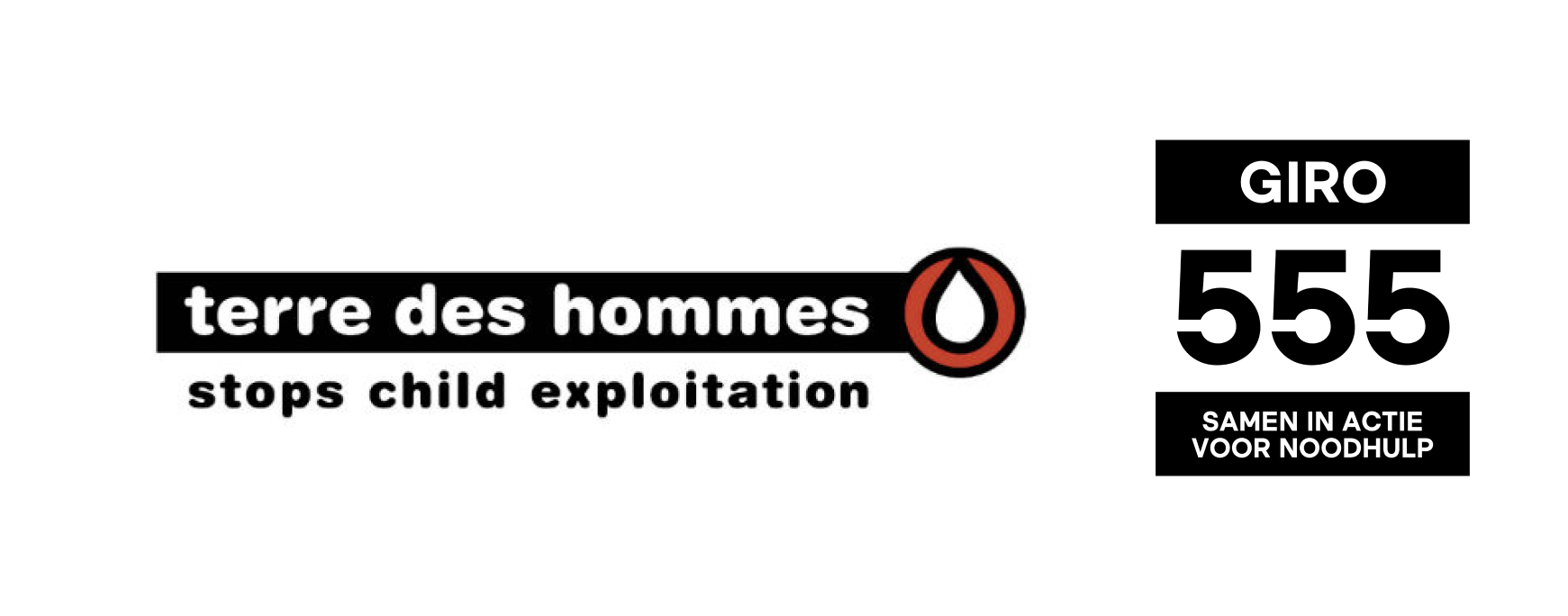
Share:
